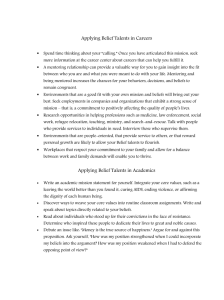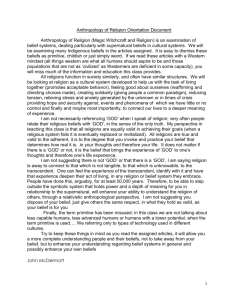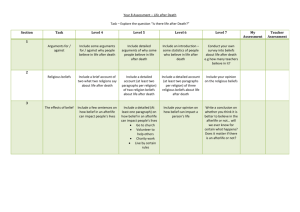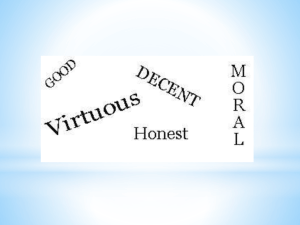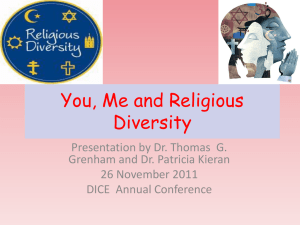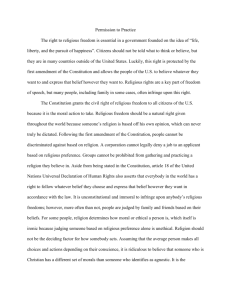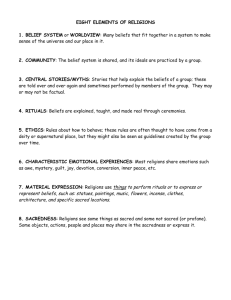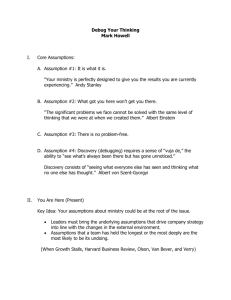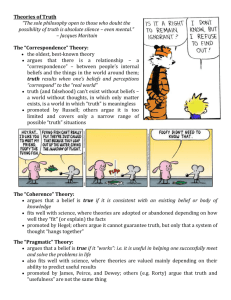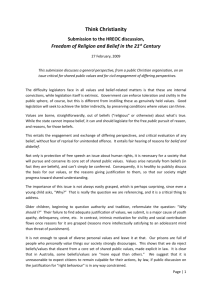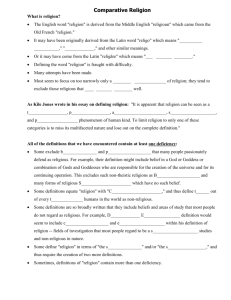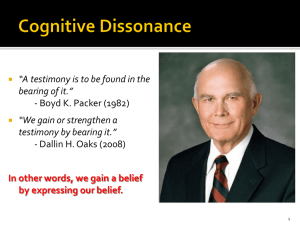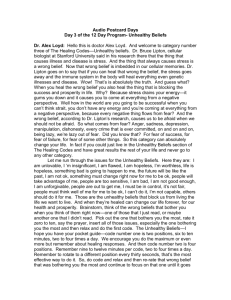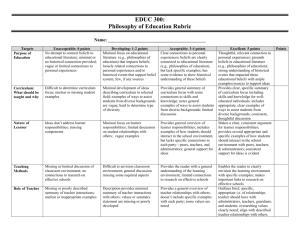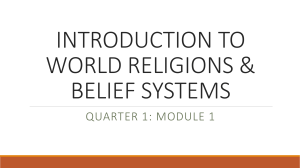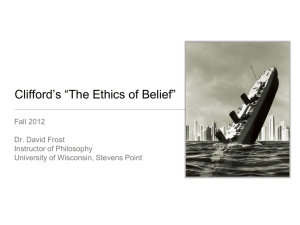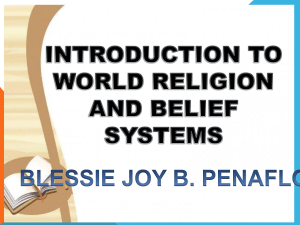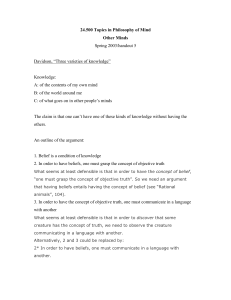A personal Belief - resources.teachnet.ie
advertisement
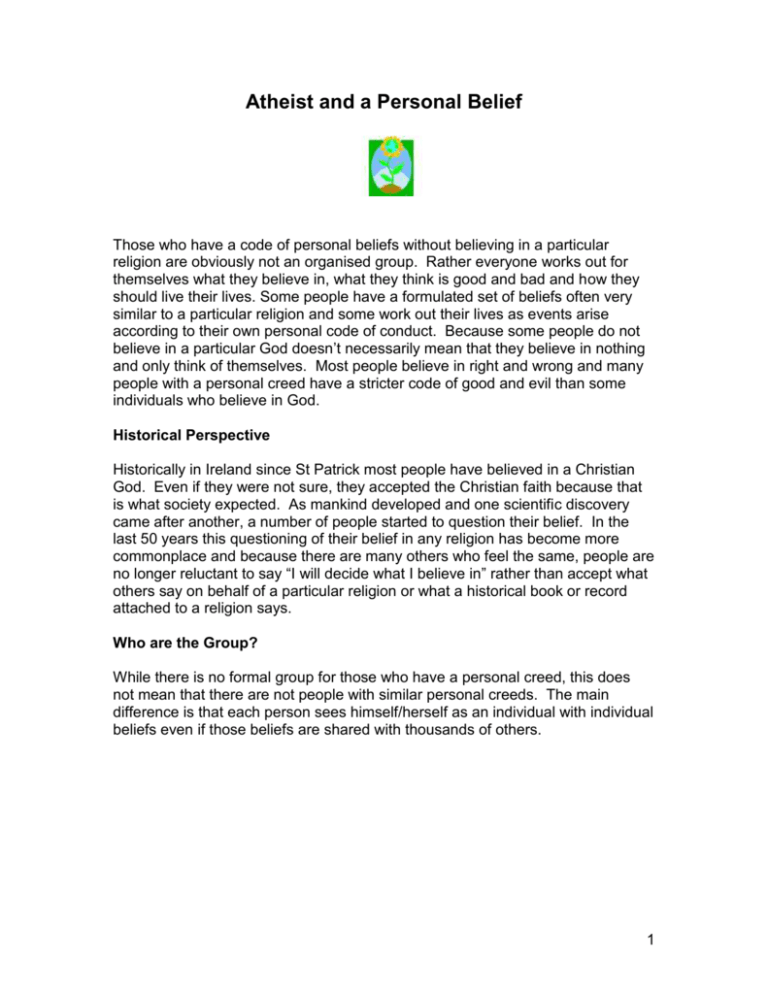
Atheist and a Personal Belief Those who have a code of personal beliefs without believing in a particular religion are obviously not an organised group. Rather everyone works out for themselves what they believe in, what they think is good and bad and how they should live their lives. Some people have a formulated set of beliefs often very similar to a particular religion and some work out their lives as events arise according to their own personal code of conduct. Because some people do not believe in a particular God doesn’t necessarily mean that they believe in nothing and only think of themselves. Most people believe in right and wrong and many people with a personal creed have a stricter code of good and evil than some individuals who believe in God. Historical Perspective Historically in Ireland since St Patrick most people have believed in a Christian God. Even if they were not sure, they accepted the Christian faith because that is what society expected. As mankind developed and one scientific discovery came after another, a number of people started to question their belief. In the last 50 years this questioning of their belief in any religion has become more commonplace and because there are many others who feel the same, people are no longer reluctant to say “I will decide what I believe in” rather than accept what others say on behalf of a particular religion or what a historical book or record attached to a religion says. Who are the Group? While there is no formal group for those who have a personal creed, this does not mean that there are not people with similar personal creeds. The main difference is that each person sees himself/herself as an individual with individual beliefs even if those beliefs are shared with thousands of others. 1 Teachings that guide one’s belief Unlike most religions there are no books on personal beliefs or priests, mullahs, rabbis or other moral guardians to help one decide what is right. This is what one person who has a personal belief has to say. As an individual I can only suggest what I believe in. As an individual I am responsible for all my actions. If I make a mistake I am responsible for the result. I do not fee guilty; that is a feeling associated with the concept of ‘Sin’. Often I do make mistakes; I generally am sorry, especially as mistakes normally hurt somebody and often hurt somebody I like or love. Instead of feeling guilty I try to undo the damage if possible and I try not to make similar mistakes again. This does not mean I am good, or live like a saint; I am as self-interested as anybody and often do things I regret. The extent to which I follow my beliefs is the degree to which my character and personal creed succeeds over short-term selfishness. The difference is that I am responsible to myself and not to a God in a later life. Living in the World If I don’t believe in God, why should it matter whether I am good or bad and why shouldn’t I do what I like when I like? There are several reasons, but the most important is that I am part of the human race and do not like to see unnecessary suffering. Most people feel pain when something horrible like a massacre or a famine is shown on television. This is not a religious reaction. It is natural sympathy for one’s fellow man. Perhaps also you feel that it would be terrible if it happened to you. This is my second reason. I try to behave to others, but particularly to my friends and loved ones, as I would like or expect them to behave to me. I hate being cheated in any way, so I try not to cheat others. If on a more positive tone, I help someone, maybe he/she will help someone else and maybe years later someone will help me when I need it. When working out what to do in life as events happen around me, I try to act in a way that doesn’t hurt people or if there is a choice where harm cannot be avoided, to cause the least harm possible. This doesn’t mean that I think all the time what is the best thing to do; mostly I just do things, some good, some bad; I generally only think things out for special problems and let the rest take care of itself. 2 Leaving the world Death is always sad. Most religions have some ceremony to help those still living to cope or to celebrate their passing to another life. Such ritual is important to us even if we don’t believe in god, but it doesn’t have to have a religious ceremony as part of it. Sometimes at the Crematorium people get up and recall events, some sad and some funny from the life of the dead person. It helps people to grieve, to remember family and friends and to celebrate their lives. Special Dates There are no special dates in a religious sense for those not connected to any religion. Birthdays, Christmas, marriages etc are all important days or days of celebration but they are not religious days or days of prayer. Special days may occur such as the birth of a child, a death, the day a child becomes an adult or leaves school. Each day may mean something different to different people and sometimes there is a lesson that we can learn from an event. For example, if someone dear to you died you might decide to spend more time with those you love while they are still alive, and maybe let them know that you love them. 3


